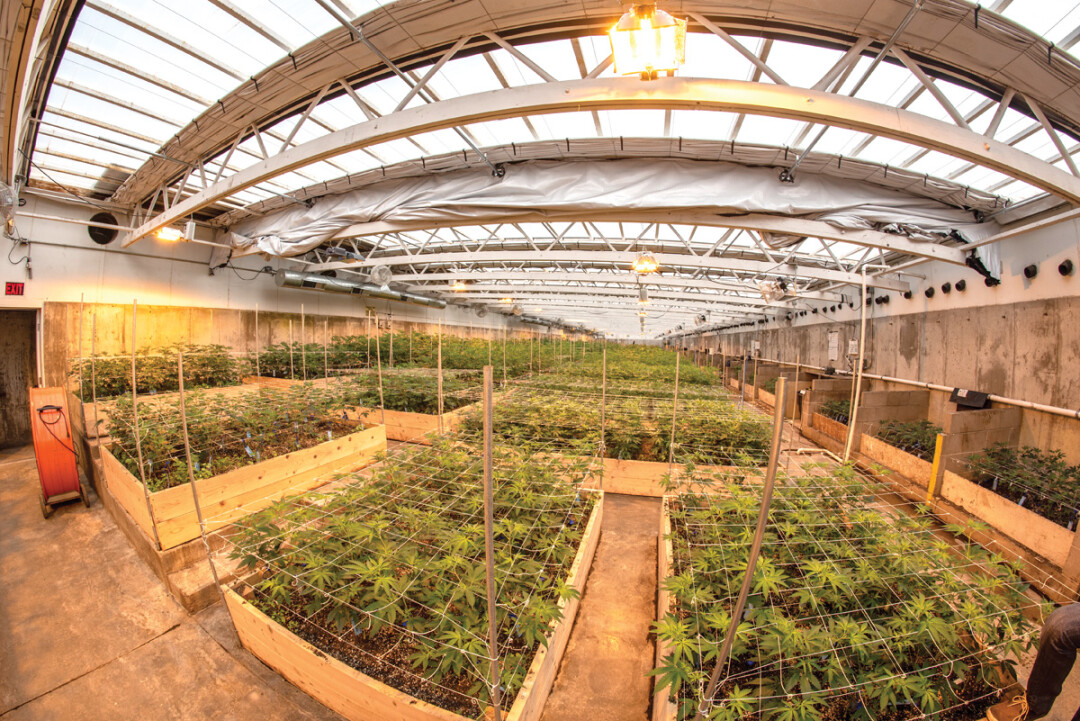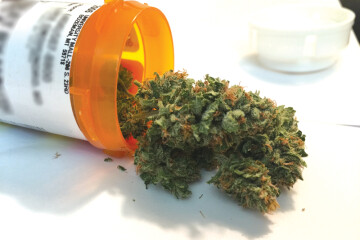Untethering For The Times
How the Medical Marijuana Program in Montana is Moving Forward
According to the most recent report available on the Montana Medical Marijuana Program’s website*, as of January 2020, there were 36,422 registered Medical Marijuana Program (MMP) patients in Montana, with 5,941 of those cardholders being in Gallatin County alone. Whether you partake in cannabis or not, chances are you have voted on the matter of medicalization, the addition of PTSD to the Qualifying Conditions List for the program, or know someone who uses CBD or medical cannabis to help ease pain, insomnia, an eating disorder, seizures, cancer, and many other issues and ailments within the mind and body.
The MMP was developed in 2004, and legislation ruling the program has gone through many changes, including raids in 2011 and legislation in 2015 that almost shut down the program completely. Montana has made headlines for its approach to medical cannabis since the inception of the program - “tethering” patients to one provider when they were granted a prescription had never been done before in any state, and the ups and downs of legislation had some of the nation’s biggest news outlets reporting about Montana’s backwards momentum in the program. Thankfully in 2016, voters showed up for the MMP and the program has finally been heading in the right direction - forward into a new decade that for cannabis in the U.S., economists predict to be a $24 billion dollar industry by 2025.
There have been many changes to the MMP in the last year, after the signing of Senate Bill 265 on May 3, 2019. In October 2019, the implementation of a monthly limit of 5 ounces of THC products went into effect, in addition to the ability for patients to print and use a “Temporary Card” that grants access to medical cannabis the same day a patient uses their prescription to apply for their MMP card with the state. However the biggest, most awaited change to the program is being enacted June 2, 2020, when the MMP becomes “untethered” and patients are able to buy their medicine from any licensed dispensary in the state.
The COVID-19 pandemic has also caused changes in the MMP; not only did the program issue protocols and emergency procedures to providers for the safety of patients, but Governor Bullock also made it easier for patients (inherently a population more immunocompromised than most) to acquire their monthly limit in one visit to their dispensary in order to counter traveling up to 5 times a month to fill their prescriptions. He also suspended required physician visits for renewing cardholders, and enabled tele-medicine visits for new patients and curbside pickup of medicine - all of which were previously prohibited.
Due to the pandemic, the cannabis industry as a whole was skeptical about the program’s ability to enact the changes required by SB265, no later than July 1, 2020. However, even with a minimal staff working under COVID restrictions, they surprised all of us with a letter issued on April 29, 2020, explaining that untethering would happen almost a whole month earlier than expected, on June 2, 2020. The letter goes on to explain some important information and reminders:
• Existing cards have provider info. printed on them and will continue to be honored after untethering takes effect. The MMP will not issue new cards without provider info. to existing registered cardholders until/unless they renew.
• Daily and monthly purchase limits are in effect. Registered cardholders may purchase any portion of their limit from multiple providers but may not exceed their daily or monthly purchase limits. Before finishing a sale, providers will check remaining purchase limits to verify compliance. Monthly purchase limits are based on calendar months.
• Registered cardholders are required to have their registry identification card in their immediate possession at all times. The registry identification card and a valid photo identification must be displayed upon demand of a law enforcement officer, justice of the peace, or city or municipal judge.
• Registered cardholders who grow their own marijuana are not eligible to purchase from the network of providers.
• At the time of writing this letter, the COVID-19 related State of Emergency is still in effect in Montana. On April 1, 2020, Governor Bullock issued a Directive implementing specific changes to the Medical Marijuana Act for the duration of the emergency. The MMP sent all registered cardholders and providers a letter outlining these temporary changes. If you did not receive this letter, please see the website for further details at www.dphhs.mt.gov/marijuana.
• Untethering allows registered cardholders greater access to their medicine during the State of Emergency by enhancing choice and flexibility in scheduling visits to purchase medicine.
• During this time, the MMP encourages all registered cardholders and providers to observe practical safety measures including social distancing. Cardholders are encouraged to call ahead to providers and take advantage of curbside delivery or home delivery when possible.
Montana MMP patients have never had the freedom to choose their medical cannabis products from multiple dispensaries before. Some cardholders have also been restricted by the providers they signed up with by not being given their patient-specific MMP Complia** information to have the ability to change providers on their own accord. The general public also seems unsure about the rules governing dispensaries, some under the impression that you have to have a card before even entering one. This is false; non-cardholders can buy CBD and hemp products below .3% THC from dispensaries, which is actually recommended over buying these products from unreliable, untested sources (such as the gas station or online), or sources that don’t have cannabinoid-specific education and training. Before COVID, most dispensaries had tours and “free smells” for potential patients. Cardholders have always had options, but the option to change providers comes at a cost - $10 per provider switch. Thanks to untethering, that won’t be an issue anymore.
As patients have never had options before, this may leave some wondering how to go about utilizing this new world of freedom of choice without getting overwhelmed. If you are perfectly happy with your dispensary, that’s awesome. They will probably be developing a system to reward current patients for returning to shop after untethering. However, you wouldn’t buy anything off of Amazon without looking at the quality of a product, cost, reviews and comparisons, awards, customer service, and how quickly that product can get to you, so why should shopping for your medical cannabis be any different?
Since cannabis is medicine, quality is paramount and not all dispensaries are created equal. It is important to only use the best CBD oil or other CBD variations. Every product batch is required to be tested, but results and quality still vary greatly. Variety and consistency go hand-in-hand with quality - they are the trifecta of successful cannabis therapy and there are many ways to look for these features while choosing where to shop. Many dispensaries have utilized online menus since the onset of the COVID pandemic, use Instagram for photos of products, Facebook and Google reviews are helpful for reviews, and Montana has an organization that advocates for patients by hosting multiple events yearly that compare and test products and strains from participating dispensaries, the Montana State Provider’s Cup***. The winning dispensaries are then awarded based on different categories of quality of specific products, including THC percentage, CBD percentage, Terpene content, and People’s Choice (based on smell and appearance).
Patient recommendations and opinions on strains, products, and terpenes have all been an integral part of cannabis research and reviews in developing online resources such as Leafly.com or Weedmaps.com, which provide consumers with up-to-date, peer-reviewed information on all things cannabis, including information on which dispensary to get specific products you are looking for. Using these tools to find where you want to make your next MMP purchase is very helpful, but also talking to your 4/20-friendly friends about their experiences with local dispensaries will point you in the right direction or steer you away from the wrong ones.
Customer service is of utmost importance, as dispensary workers are the liaison between the patient and the plant. Dispensary workers have specific knowledge about the endocannabinoid system, cannabinoids, terpenes, and the way they interact and work with your body. They should know the products in their shop backwards and forwards, especially in relation to recommendations for your greatest relief. Patience, kindness, making you feel welcome - anything you enjoy about a positive retail experience is everything you should get in your medical marijana dispensary experience. Convenience is also rolled into that - location, hours and days open, ways of contacting the shop, and accessibility to the products you know help are all important things to consider.
Let’s be honest, in this economy, Cost is King. Comparing prices is as second-nature to most of us as riding a bike, and patients will find that prices for medical marijuana products vary greatly across the state, even across the valley. This may leave you wondering if you have to sacrifice quality for affordability, and fortunately, that’s not the case in Montana. Patients will be surprised at what they can find if they look in the right places! Many dispensaries offer discounts, rewards systems, and have weekly deals to benefit patients, especially those on a budget. Don’t be afraid to call around and ask questions before venturing out to shop; you will find most providers are searchable on Google. Most are still working under curbside-only protocols, which is something to be aware of if you’re looking to visit stores.
With 67 registered MMP Providers in Gallatin County, and 249 across Montana, there are ample choices this June for cardholders needing cannabis. Patients have always deserved to have choices when it came to where they bought their medicine, and the freedom to compare products from different places for their maximum health benefit. It took 16 years for the state to recognize this, and now that Montana has opened up this option, utilizing it for the success of patients is exciting and promising for the future of cannabis in Big Sky Country.
*https://dphhs.mt.gov/marijuana
** https://mt-public.mycomplia.com/#!/signin
***https://www.facebook.com/montanastateproviderscup/
Photos compliments of GROW MAGAZINE



